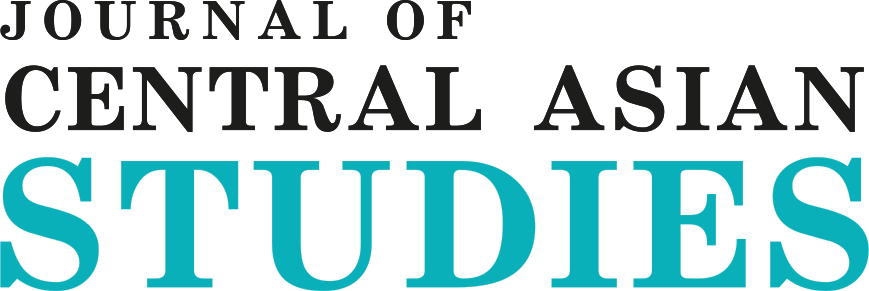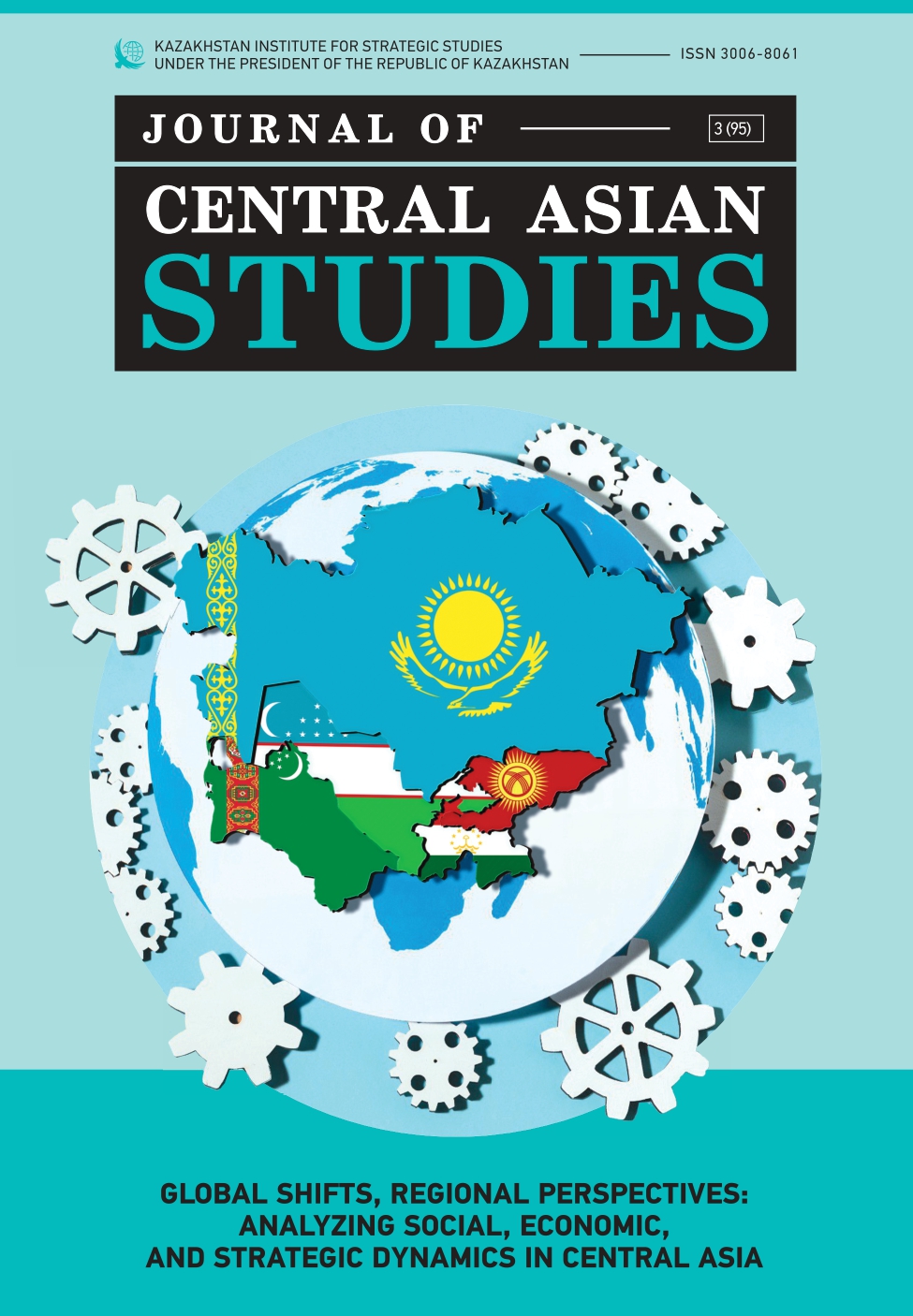Траектории миграции узбекских студентов во Францию и Великобританию
DOI:
https://doi.org/10.52536/3006-807X.2024-3.04Ключевые слова:
Международная студенческая мобильность, студенческая миграция, Узбекистан, Франция, ВеликобританияАннотация
В этой статье представлен всесторонний обзор избранных результатов, извлеченных из докторской диссертации, с использованием сравнительного анализа для изучения траекторий узбекских студентов во Франции и Великобритании в период с 2004 по 2009 год. В статье предлагается интегрировать элемент траектории в существующие теории международной студенческой мобильности и международной миграции, уделяя особое внимание контексту мобильности Юг-Север.
Используя качественные методы исследования, включая интервью, опросы и наблюдение за участниками, исследование подчеркивает важность отслеживания путей мигрантов в течение длительного периода для детального понимания стратегий мигрантов и государственной политики, с которой они сталкиваются. Данные свидетельствуют о том, что строгие меры существенно влияют на траектории мигрантов, не обязательно вынуждая их возвращаться в страны происхождения.
Миграция для учебы выходит за рамки финансовых соображений, поскольку она также отвечает требованиям новой социальной иерархии, возникающей в родной стране. По сути, миграция в целях обучения открывает людям разнообразные перспективы, выходя за рамки упрощенного представления о линейном путешествии из пункта А в пункт Б.
Библиографические ссылки
Alimukhamedov, F. (2020). The internationalisation of higher education in Uzbekistan: Some thoughts about Uzbek student mobility and spatial distribution of research cooperation. Annals of the University of Bucharest / Political science series, 22(1-2), 61-88.
Alimukhamedov, F., Kozlowska, M., Melenchuk, A., Kereyev, A. (n.d.). Capacity and Needs Assessment Report On Migrants with Children, MIEUX+ Action, Kazakhstan II report, MIEUX+, ICMPD, Brussels.
Akkari, A., Seidikenova, A., Bakitov, A., Minazheva, G. (2023). Internationalization of Higher Education in Kazakhstan: from political will to implementation. Ensaio: Avaliação e Políticas Públicas em Educação. 31. 10.1590/s0104-40362023003103730
Axyonova, V. (2015). The Effectiveness of Sanctions and Regime Legitimacy in Central Asia: Examining the Substance of EU Sanctions against Uzbekistan. L'Europe en Formation, 375, 19-35. https://doi.org/10.3917/eufor.375.0019
Azimbayeva, G., Harford, J. (2017). Comparing post-Soviet changes in higher education governance in Kazakhstan, Russia, and Uzbekistan. Cogent Education, 4(1). https://doi.org/10.1080/2331186X.2017.1399968.
Balmer, B., Godwin, M., & Gregory, J. (2009). The Royal Society and the “Brain Drain”: Natural Scientists Meet Social Science. Notes and Records of the Royal Society of London, 63(4), 339–353. http://www.jstor.org/stable/40647309
Blaud, C. (2001). La migration pour études: la question de retour et de non- retour des étudiants africains dans le pays d'origine après la formation, Paris, L'Harmattan.
Carling, J. (2002). Migration in the age of involuntary immobility: Theoretical reflections and Cape Verdean experiences. Journal of Ethnic and Migration Studies, 28(1):5-42.
Chankseliani, M. (2015). Escaping Homelands with Limited Employment and Tertiary Education Opportunities: Outbound Student Mobility from Post-Soviet Countries. Population, Space and Place, Published online in Wiley Online Library (wileyonlinelibrary.com) DOI: 10.1002/psp.1932.
de Haas H. (2010). Migration transitions: a theoretical and empirical inquiry into the developmental drivers of international migration, Working Paper n° 24, International Migration Institute, Oxford
de Haas, H., and Natter K. (2015). The Effect of Government Party Orientation on Immigration Policies. IMI Working Paper Series.Oxford, UK:International Migration Institute, University of Oxford.
Del Sordi, A. (2017). Sponsoring student mobility for development and authoritarian stability: Kazakhstan’s Bolashak programme. Globalizations, 15(2), 215–231. https://doi.org/10.1080/14747731.2017.1403780
Ennafaa, R. and Paivandi, S. (2008). Le non-retour des étudiants étrangers : au-delà de la «fuite des cerveaux», Formation emploi [Online], 103 | juillet-septembre 2008, Online since 01 September 2010, connection on 04 February 2024. Retrieved from http://journals.openedition.org/formationemploi/2356; DOI: https://doi.org/10.4000/formationemploi.2356.
Home Office (2003). Control of Immigration: Statistics United Kingdom 2002, p. 110, accessed via FROMCCI (publishing.service.gov.uk).
Huisman, J., Smolentseva, A., Froumin, I. (2018). 25 years of transformations of higher education systems in post-Soviet countries. New York: Palgrave Macmillan.
Hwami, M., Yeszhanova, S., Amanzhol, M., Okafor, C. E., Tursynbayeva, M. (2024). Internationalization of higher education in Central Asia: a systematic review. Central Asian Survey, 43(3), 400–419. https://doi.org/10.1080/02634937.2024.2317830
Jonbekova, D., Serkova, Y., Mazbulova, Z., Jumakulov, Z., Ruby, A. (2022). How international higher education graduates contribute to their home country: an example from government scholarship recipients in Kazakhstan. Higher Education Research & Development, 42(1), 126–140. https://doi.org/10.1080/07294360.2021.2019200
Kenebayeva, A. (2018). Internationalization of Higher Education in Kazakhstan: National Capacity-Building Initiatives. In Policies and Initiatives for the Internationalization of Higher Education, IGI Global (pp.153-174), 10.4018/978-1-5225- 5231-4.ch009.
Kuzhabekova, A. (2020). Invisibilizing Eurasia: How North-South Dichotomization Marginalizes Post-Soviet Scholars in International Research Collaborations. Journal of Studies in International Education, 24(1), 113-130.
Lomer, S. (2018). UK policy discourses and international student mobility: the deterrence and subjectification of international students. Globalisation, Societies and Education, 16:3, 308-324, DOI: 10.1080/14767724.2017.1414584
MacLeod, D. (2004). Government investigates hundreds of bogus colleges. Retrieved from theguardian.com: https://www.theguardian.com/education/2004/jul/23/highereducation.uk1
Moldashev, K., Tleuov, A. (2022). Response of local academia to the internationalization of research policies in a non-Anglophone country. Education Policy Analysis Archives, 30(56). https://doi.org/10.14507/epaa.30.6788
Mukhitdinova, N. (2015). Central Asia, in UNESCO Science Report, Towards 2030. Paris: UNESCO, pp. 365-387. Retrieved from: http://en.unesco.org/USR-contents Naqvi, Naveed Hassan and Kheyfets, Igor. 2014. Uzbekistan - Modernizing Tertiary Education. Washington, D.C.: World Bank.
Odden, G. (2010). Parcours et projets des migrants subsahariens en Espagne, Hommes & migrations, 1286-1287.
UNESCO Data (2024). Other policy relevant indicators: Outbound internationally mobile students by host region. Retrieved from data.uis.unesco.org: https://data.uis.unesco.org/index.aspx?queryid=3807
Paivandi, S. (2018). Performance universitaire, apprentissage et temporalité des étudiants, Revue française de pédagogie, (n° 202), p. 99-116.
Ruziev, K., Burkhanov, U. (2018). Uzbekistan: Higher Education Reforms and the Changing Landscape Since Independence. In 25 Years of Transformations of Higher Education Systems in Post-Soviet Countries, edited by Huisman J., Smolentseva A., Froumin L, Palgrave Studies in Global Higher Education. Palgrave Macmillan.
Sabzalieva, E. (2015). Challenges in contemporary higher education in Kyrgyzstan, Central Asia. Perspectives: Policy and Practice in Higher Education, DOI: 10.1080/13603108.2015.1011727
Sabzalieva, E., Martinez, M. and Sâ, C. (2020). Moving Beyond "North" and "South": Global Perspectives on International Research Collaborations. Journal of Studies in International Education, 24(1), 3-8.
Sagintayeva, A. and Kurakbayev, K. (2013). Internationalisation of Higher Education in Central Asia: the Case of Kazakhstan. In Going Global: Identifying Trends and Drivers of International Education, editiors Stiasny, M. and Gore, M. Emerald: Bingley, UK. pp. 17-27.
Syed Zwick, H. (2019). Le modèle de motivation – opportunité – capacité : application à la mobilité étudiante régionale en Asie centrale. Journal of international Mobility, 7, 45-68. https://doi.org/10.3917/jim.007.0045
Tinto, V. (1993). Leaving College: Rethinking the Causes and Cures of Student Attrition (2nd ed.). University of Chicago Press, Chicago, IL
Tirado, D. (2019). West-Central Asia: A comparative analysis of students' trajedories in Russia (Moscow) from the 1980s and China (Yiwu) from the 2000s. Journal of Eurasian Studies, 10(1), 48-60.
Uralov, O. (2020). Internationalization of higher education in Uzbekistan, Social Sciences & Humanities Open, Volume 2, Issue 1, 100015, ISSN 2590-2911, https://doi.org/10.1016/j.ssaho.2020.100015.
Ubaydullaeva, D. (2019). Trends in Internationalization of Higher Education in Uzbekistan: The Proliferation of Foreign University Branches and How They Fit into the Broader Higher Education Sector, in Marlene Laruelle (ed.) New Voices from Uzbekistan, The George Washington University, USA, 41-55.
Van Mol, C., de Valk, H. (2016). Migration and Immigrants in Europe: A Historical and Demographic Perspective. In: Garcés-Mascareñas, B., Penninx, R. (eds) Integration Processes and Policies in Europe. IMISCOE Research Series. Springer, Cham. https://doi.org/10.1007/978-3-319-21674-4_3
Whitehead, T. (2009). Bogus colleges are “Achilles Heel” of immigration system, say Phil Woolas. Retrived from the telegraph.co.uk: https://www.telegraph.co.uk/education/educationnews/5083517/Bogus-colleges-are-Achilles-Heel-of-immigration-system-say-Phil-Woolas.html
Загрузки
Опубликован
Выпуск
Раздел
Лицензия
Copyright (c) 2024 Алимухамедов Ф.

Это произведение доступно по лицензии Creative Commons «Attribution» («Атрибуция») 4.0 Всемирная.











 Open content is licensed under the CC-BY
Open content is licensed under the CC-BY 